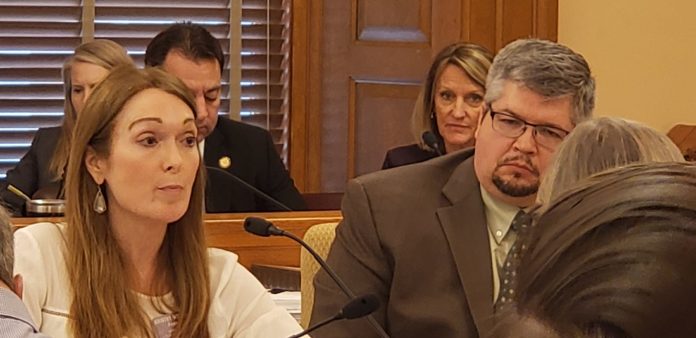Senate negotiators remained steadfast in support of their school finance proposal as talks started Monday to hammer out a funding plan to satisfy the state Supreme Court.
Sens. Molly Baumgardner, Jim Denning and Anthony Hensley showed no signs of retreating from a plan that would add about $90 million a year to education to meet a state Supreme Court order to adequately fund education.
“We feel very comfortable in our position because we know the Board of Education approved this position in their budgeting in July,” said Baumgardner, chair of the Education Committee and the lead negotiator for the Senate.
“We know the governor somewhat took that same position when she came out with her budget in January,” Baumgardner said.
With similar conclusions reached by the Board of Education, the governor, the Senate as well as legislative attorneys, the Senate plans to stick “firm” to its education plan, Baumgardner said.
Senators are confident that the plan they approved – first introduced by the governor at the start of the legislative session – will meet the Supreme Court’s order.
Gov. Laura Kelly’s education plan, approved 32-8 in the Senate, puts about $90 million into schools in 2020 and 2021 each, with the money intended to cover the cost of inflation to comply with the Supreme Court’s ruling from last year.
Her plan promises to put about $90 million into schools for fiscal years 2022 and 2023 as well.
The House parked the governor’s plan in a committee and advanced its own proposal.
The House finance plan, which was never voted on by the full chamber, puts a similar amount into schools in 2020 and 2021 but puts about half that money into targeted spending on mental health programs and at-risk students.
It also earmarks money for school security grants, dyslexia training and several other programs.
However, the House plan does not provide money beyond the first two years and removes money the Legislature approved last year for 2022 and 2023.
Time is of the essence to settle the school funding debate this year. Legal briefs in the case are due with the court on April 15 and the Legislature’s regular session ends this Friday before lawmakers return home for spring break.
Hensley, the Democratic minority leader, questioned how the House can even negotiate school funding when the chamber hasn’t even voted on a plan.
“The House doesn’t have a position,” Hensley said.
The House’s lead negotiator, Rep. Kristey Williams, said her chamber’s funding plan was approved by a committee.
Hensley shot back, “But it’s not a position of the entire House.”
Responded Williams, “It’s the position that we have for the House right now through the committee.”
Hensley came back, “I’ve always thought that when you’re in a conference committee, you bring the position that was passed by the entire House or the Senate to the conference committee.
“I don’t know how you can argue that’s the House position. It’s the committee position,” Hensley said. “But it’s not the House position because you don’t have a position.”
House and Senate negotiators met three times Monday with most of the talks focused on the education policy bill approved by the House last week.
The Senate agreed to a couple of provisions, including a legislative audit of the unencumbered balances of school districts.
Senators also agreed to a provision requiring the Board of Education to provide the ACT college entrance exam and the three ACT WorkKeys assessments to each student enrolled in grades 11 and 12 at no charge. It also would provide one pre-ACT exam for each student in the ninth grade.
The Senate already added this as a proviso to its version of the budget.
There are, however, a number of unresolved policy matters including:
- A requirement for Department of Education to create one-page performance accountability reports for the state, each school district, and each school building. The performance accountability reports would be required to include information required by the federal Every Student Succeeds Act.
- A requirement for the education department to prepare annual longitudinal reports on student achievement on the state assessment for English language arts, math and science.
- Eliminating a law that provides for special education state aid at a rate of 92 percent of excess costs. It would be replaced with a requirement that the State Board of Education set the excess cost percentage based on the appropriations for special education for that school year.
- Revising a program that offers tax credits to entice businesses to donate money for scholarships that send the least affluent students to private schools. It now would make the scholarships available to the 100 lowest performing elementary schools, not just the lowest performing schools in general.
- Requiring school districts to provide transportation to students living less than 2.5 miles from their school if there is no safe pedestrian route and there is no additional cost.
- Extending the work of the dyslexia task force by three years.
- Limiting the bilingual weighting to no more than seven years.
Talks resume Tuesday morning.
















